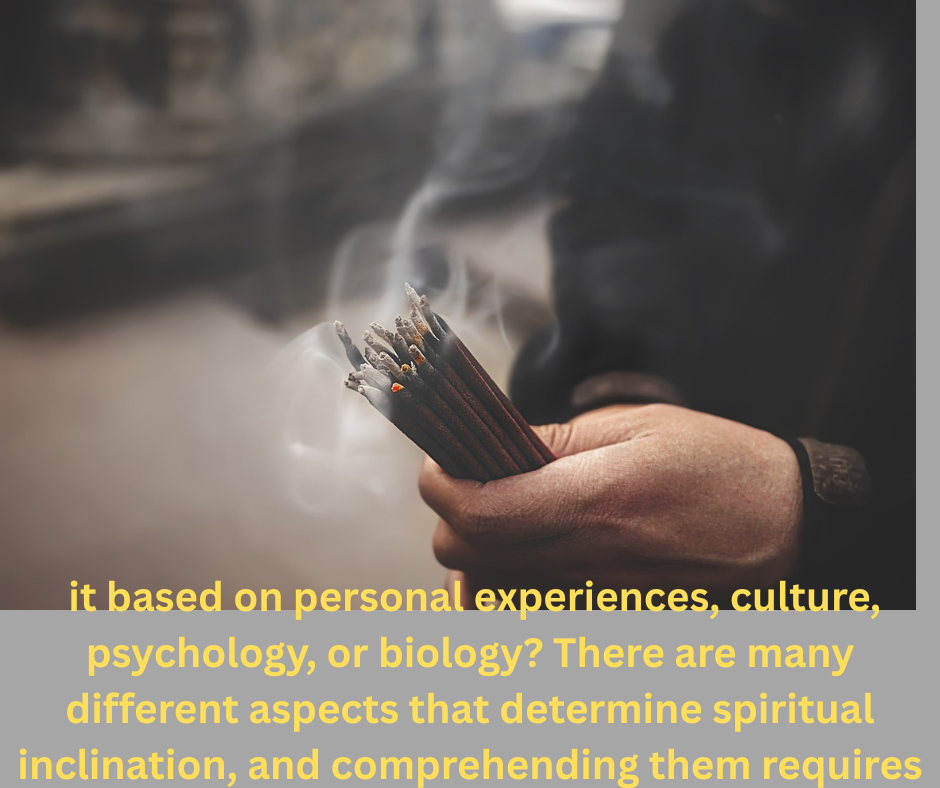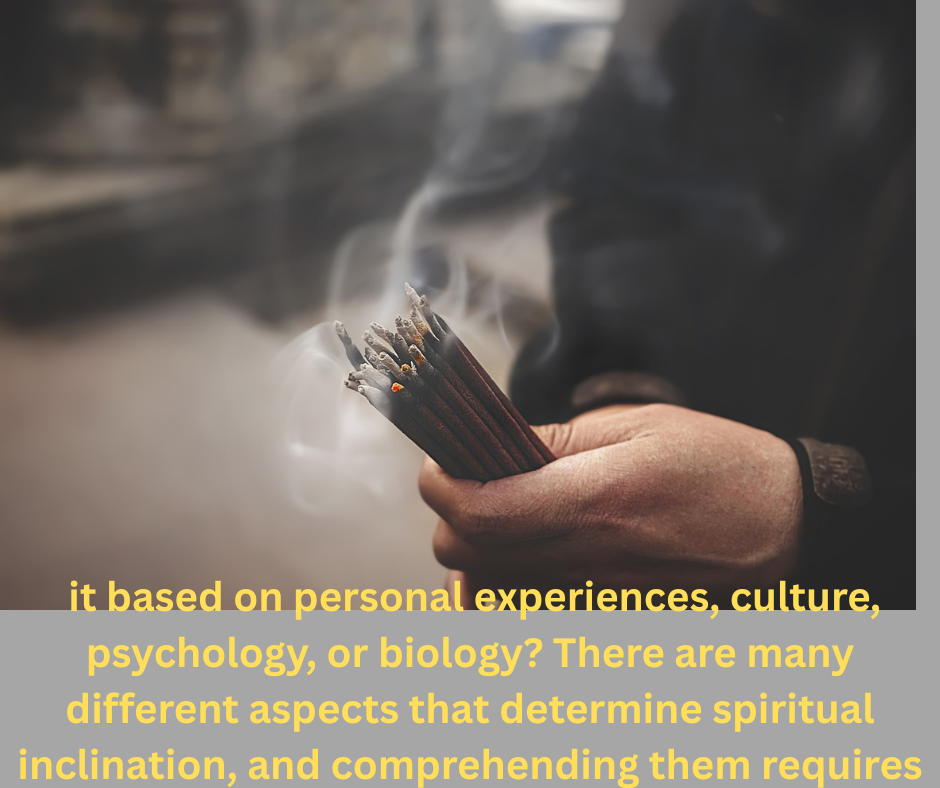Some People More Spiritually ,A person’s relationship to a higher power, the universe, or a more profound sense of purpose defines their spirituality, a very personal and intricate part of life. It can take many different forms, including mindfulness, meditation, religious activities, or just a sense of being a part of the world. While some people may exhibit little interest in spirituality, others may appear to be more spiritually oriented than others, regularly seeking spiritual significance in their life or participating in intense spiritual activities.

What causes this discrepancy? Is it based on personal experiences, culture, psychology, or biology? There are many different aspects that determine spiritual inclination, and comprehending them requires looking at how one’s personality, surroundings, and the larger framework of cultural and societal ideals interact.
Table of Contents
Genetic and Biological Factors
The idea of biological predispositions is one of the first things to take into account while examining why some people are more spiritually inclined than others. Although most people consider spirituality to be a cultural or personal experience, researchers have discovered evidence that spiritual traits may be influenced by genetic factors.
Furthermore, neurological studies on the brain’s function in spirituality indicate that individuals who practice spirituality may have higher activity in specific brain regions, such as the temporal lobes and the prefrontal cortex. Some People More Spiritually ,Research on “spiritual experiences” indicates that these domains are implicated in religious experiences as well as contemplative or meditation techniques.
This suggests that a person’s ability to have spiritual experiences may have a biological foundation. According to several studies, people who are more sensitive to these brain processes might be more oriented toward spirituality and to seek out religious experiences.
Psychological Factors and Individual Differences
A person’s spiritual preferences are greatly influenced by psychological variables. Individuals’ propensity to pursue spiritual fulfillment or participate in spiritual activities can be influenced by their personality traits, emotional requirements, cognitive styles, and early life experiences.
Attachment style, or the emotional connection people develop with their early caregivers, is a crucial psychological component. People who have a secure attachment to their caretakers are more likely to feel emotionally secure and trusting, which may make them more receptive to pursuing spiritual interests and other relationships. Some People More Spiritually, Conversely, people with insecure attachment styles—particularly those who are nervous or avoidant—may view spirituality differently.
Some people find that faith gives them peace and stability, which helps them deal with worry or emotions of uncertainty. Spirituality can provide as a haven, a means of understanding their experiences, and a path to finding comfort and meaning for persons who may have been subjected to emotional neglect or trauma.
Meaning-making is another psychological component. People are inherently driven to discover meaning and purpose in their life. Some people find that spirituality offers a framework for comprehending the intricacies of life, such as pain, death, and the pursuit of fulfillment.
Individuals with an innate propensity for existential contemplation—those who frequently ask themselves questions such as “What is the meaning of life?” or “What happens after death?”—may be more likely to discover spiritual solutions that speak to their inner yearning for meaning.
Additionally, spiritual participation might be influenced by cognitive types. Those who are more contemplative or introspective could be more likely to look into spirituality as a way to better understand who they are and how they relate to the world. Some People More Spiritually,People who have a more pragmatic or rational attitude to life, on the other hand, could be less interested in spiritual exploration and more focused on tangible or material issues.
Early Life Experiences and Family Influence
A person’s early experiences—especially those pertaining to family and upbringing—have a significant impact on whether or not they develop a spiritual bent. A person’s worldview, including their views on religion and spirituality, is greatly influenced by their home environment. While children raised in secular houses could be less exposed to spiritual traditions, children raised in religious households are more likely to follow in their parents’ spiritual or religious practices.
However, spiritual tendencies are influenced by more than just whether or not religion is practiced in the family. Children’s spiritual beliefs can also be greatly influenced by the manner they are taught. Some People More Spiritually,Children who grow up in a setting that promotes the free, non-dogmatic study of spirituality, for instance, may be more likely to adopt their own spiritual ideas and practices as adults.
On the other hand, depending on their individual experiences and subsequent decisions, children who grow up in a restrictive or authoritarian religious environment may either accept or reject the spiritual traditions they were exposed to.

Spiritual inclinations can also be significantly impacted by early experiences of trauma, grief, or existential reflection. People who go through a lot of hardships sometimes look to spirituality to help them make sense of their pain. This could show up as turning to religious rituals, meditation, or prayer for solace. People who have experienced severe adversity may occasionally have life-changing spiritual awakenings that inspire them to delve deeper into their faith.
Social and Cultural Influences
People may be more likely to embrace spiritual practices as a component of their cultural identity in societies where religion or spirituality is integral to daily life, as is the case in many regions of South Asia, the Middle East, and Latin America. Through the reinforcement of spiritual ideas and actions by family, community, and social institutions, these civilizations may cultivate a profound commitment to collective spiritual traditions.
In contrast, spirituality may be less institutionalized and people may be more inclined to take a personal, tailored approach to their spiritual lives in more secular or individualistic civilizations, like many Western nations. Some People More Spiritually, In these kinds of civilizations, people may investigate spirituality by their own experiences, looking for purpose in yoga, mindfulness, or investigating other religious traditions.
Spiritual preferences are also shaped by peer pressure and social networks. Individuals may be more likely to follow similar habits if they are part of social organizations that place an emphasis on spirituality, meditation, or religious community life.
In societies that encourage group worship, ritual, or meditation, group dynamics can help people feel validated and like they belong. On the other hand, those who are part of more materialistic or secular social circles can be less inclined to engage in spiritual activities, particularly if those activities are not valued in their community.
The Role of Personal Growth and Spiritual Crises
The experience of spiritual crises or personal growth is another important aspect that influences spiritual inclination. Some people’s spiritual inquiry is a slow process that changes as they get older and face obstacles in life. Others might have a “spiritual crisis,” which is frequently brought on by significant life events like a loved one passing away, a terrible illness, or deep existential reflection.
A deeper quest for spiritual insight and significance may be sparked by these encounters. People may seek solutions to existential problems as a result of a spiritual crisis, which may encourage them to become more deeply involved in their spiritual lives. On the other hand, because they are skeptical about spiritual remedies for their own suffering or because they are afraid or disbelieving, some people may oppose spiritual research at these trying times.
Conclusion
The reason why some people are more spiritually oriented than others is a complicated and multidimensional subject that involves a complex interaction between psychological qualities, early life experiences, social and cultural influences, personal life events, and genetic predispositions.
Some People More Spiritually ,While some people are inherently more receptive to spiritual discovery, others could discover their spiritual path via hardship, introspection, or a search for purpose.
The variety of spiritual paths emphasizes the intensely individualized character of spirituality and the various ways people look for a deeper sense of meaning and purpose in their life. In the end, there is no easy way to determine what causes some people to be more spiritually oriented than others; rather, it is a reflection of the wide range of variables that influence human experience.
